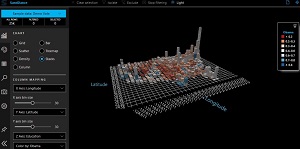News
Microsoft Research's SandDance Data Visualization Tool Goes Open Source
A data visualization tool some four years in the making from Microsoft Research has been open sourced, available for use as an extension for Visual Studio Code or Azure Data Studio.
While the project was parked on GitHub last April, the company just today bumped up the version number and removed the "Preview" status from a file in its GitHub site.
"SandDance, the beloved data visualization tool from Microsoft Research, has been re-released as an open source project on GitHub," said Dan Marshall, principal research software development engineer, in an Oct. 10 blog post. "This new version of SandDance has been re-written from the ground up as an embeddable component that works with modern JavaScript toolchains."
 [Click on image for larger, animated GIF view.] SandDance in Action (source: Microsoft).
[Click on image for larger, animated GIF view.] SandDance in Action (source: Microsoft).
In the new architecture, the offering comes in different components that can be used in native JavaScript or React apps, along with open source libraries.
"We hope that with this new architecture, SandDance will be vastly more extensible, enabling new chart types, layers, and interactions, as well as being incorporated into new, vertical applications," Marshall said.
The VS Code extension is available here, while the Azure Data Studio extension is described here. "By using easy-to-understand views, SandDance helps you find insights about your data, which in turn help you tell stories supported by data, build cases based on evidence, test hypotheses, dig deeper into surface explanations, support decisions for purchases, or relate data into a wider, real world context," the Visual Studio Code Marketplace listing states.
More information about the project, including an introduction, changelog, list of components and other resources, is available here.
About the Author
David Ramel is an editor and writer at Converge 360.